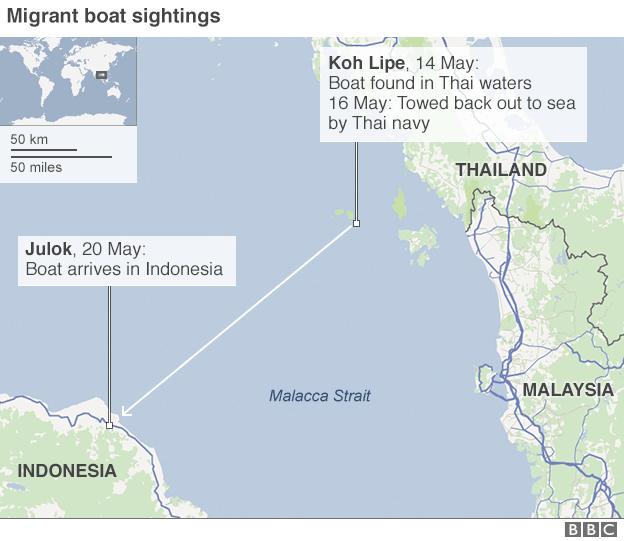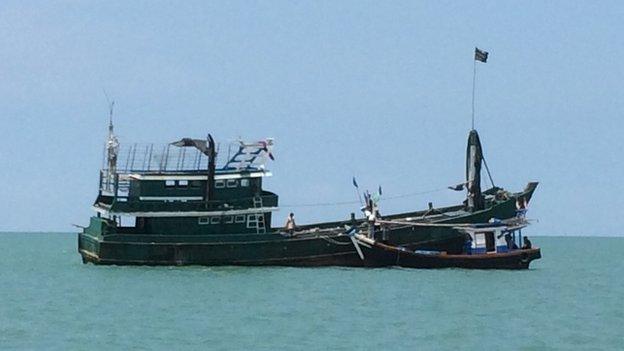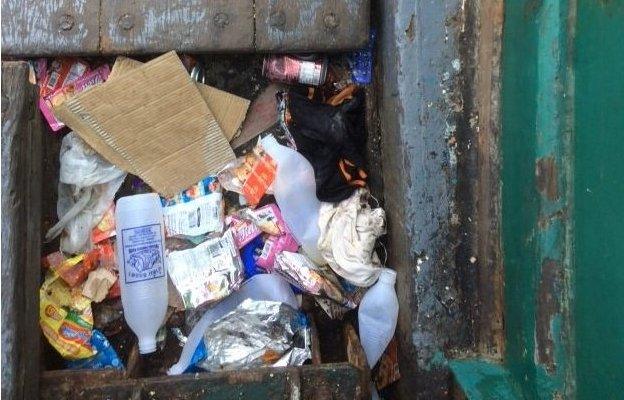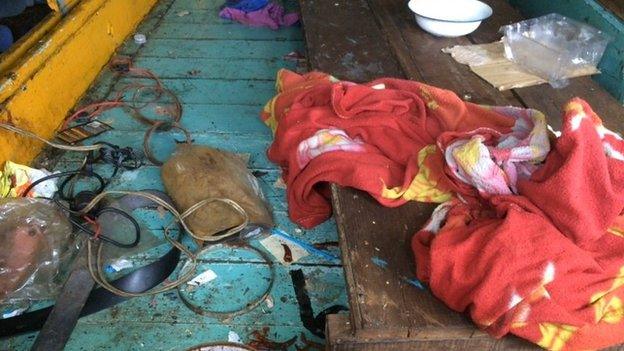Missing migrant boat found as countries offer shelter
- Published
A BBC team has been on the trawler and found appalling conditions
Migrants found by the BBC last week drifting off the coast of Thailand have been rescued by Indonesian fishermen.
A BBC reporter who reached their boat says it is filthy and insect-infested.
In a significant change, Malaysia and Indonesia agreed to offer temporary shelter to 7,000 stranded migrants. Thailand also said it would no longer push back the stranded boats.
Nearly 3,000 Bangladeshi and Rohingya migrants have come to shore in recent weeks, but many have been turned away.
Malaysia's Foreign Minister Anifah Aman announced the policy change after emergency talks in Kuala Lumpur with his Indonesian and Thai counterparts on the growing humanitarian crisis.
Thailand earlier failed to join its neighbours in their commitment to shelter the migrants but later said it too would no longer push back boats stranded in its territorial waters. It also said it would continue to provide humanitarian assistance.
The BBC's Jonathan Head found the boat off Thailand (Thursday 14 May): "This is just the most extraordinary scene"

Analysis: Jonathan Head, BBC News, Thailand
It is unusual to see open disagreement between South East Asian countries, but the empty Thai podium in Kuala Lumpur at what was meant to be a joint statement by foreign ministers of the three countries suggested Thailand was not on board with the deal.
But several hours later, Thailand has come round - in a long statement on the problem of migrants from Myanmar and Bangladesh, the Thai foreign ministry slipped in a sentence stating that it would no longer push back boat people entering its territorial waters.
The earlier statement from its neighbours Malaysia and Indonesia said they would offer shelter to the migrants, several thousand of whom are still believed to be out in the Andaman Sea - but they asked for international assistance to resettle them within a year. How that will be achieved remains unclear.

'Towed out'
The migrant boat which arrived off Indonesia's northern Aceh province on Wednesday, was first spotted drifting last Thursday.
Those on board told the BBC's Jonathan Head at the time that they had been abandoned by people-smugglers and were running out of food and water. They said 10 people on board had already died.
The Thai navy gave them food and water and later fixed the boat's engine and towed them out to sea. Contact was then lost with the boat.

The migrants say they were towed out to sea three times by the Thai and Malaysian navies and described how the Malaysian authorities escorted them virtually the whole way to Indonesia warning them never to return.
The BBC's Xinyan Yu, who is on board the abandoned trawler, says it is dirty and covered in bottles of pepper sauce, dirty plates and plastic bags of instant noodles. The smell is overwhelming she adds.
More than 400 people were rescued off Aceh on Wednesday.

Smaller fishing boats picked up the migrants from the trawler and took them to shore

The boat has a few floors below the deck that are covered with filthy plastic bottles and clothes

There are insects crawling all over the walls
Speaking after the emergency meeting in Malaysia, Foreign Minister Aman said his country and Indonesia would stop towing the boats into others' territorial waters.
But he warned they would only provide shelter if the migrants came ashore, and under the condition that the international community would help to repatriate or resettle them within a year.
'Important step'
Rights groups, who have repeatedly called on the governments of the three nations to prioritise saving the lives of those on board, have welcomed Wednesday's announcement.
The UN refugee agency, UNHCR, said it was "an important step" in resolving the crisis, but warned it was "urgent for people to be brought to shore without delay".
International Organisation for Migration spokesman Jeff Labovitz said the immediate offer of help would save lives by getting thousands of people off the high seas to safety.

Regional reaction to migrant deal
News organisations in Malaysia and Indonesia were quick to pick up on the temporary nature of the deal.
Indonesia's Metro TV points out that the migrants would be taken in for "a maximum of one year" while the moderate Muslim daily Republika highlights the religion minister's comment that "Rohingya refugees must behave themselves".
News website Viva explains Indonesia's apparent change of heart on the issue by suggesting that the country's founding philosophy of 'Pancasila' requires it to help the migrants.
Meanwhile, Malaysian newspaper The Malay Mail quotes the foreign minister as saying the country intended to help all along. "Putrajaya [the government] denies shunning Rohingya 'boat people'", its headline reads.
But Marina Mahathir, a popular columnist who is also the daughter of a former Malaysian prime minister, suggests on Facebook that the deal was the result of pressure from activists, writing, "Yay! Your advocacy worked, folks!!"

While the agreement is seen as a good step forward it only applies to migrants currently at sea, as Mariko Oi reports

Why has this crisis erupted?

Rohingya Muslims mainly live in Myanmar, where they have faced decades of persecution.
Rights groups say migrants feel they have "no choice" but to leave, paying people smugglers to help them. The UN estimates more than 120,000 Rohingyas have fled in the past three years.
Traffickers usually take the migrants by sea to Thailand then overland to Malaysia.
But Thailand recently began cracking down on the migrant routes, meaning traffickers are using sea routes instead.

Have you been affected by the issues raised in this story? Are you a Bangladeshi or Rohingya migrant? You can email haveyoursay@bbc.co.uk, external.
If you would be happy to speak further to a BBC journalist, please include a contact telephone number when emailing us your details.
Send your pictures and videos to yourpics@bbc.co.uk, external,r text them to 61124 (UK) or +44 7624 800 100 (international) or via our WhatsApp number +44 (0)7525 900971 .
You can also upload here, external.